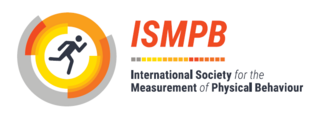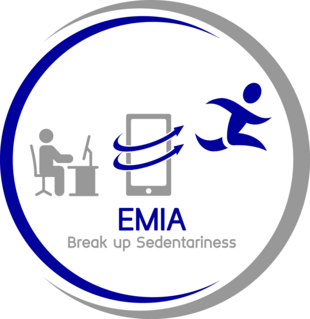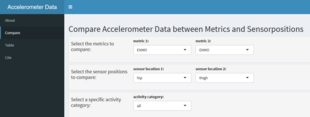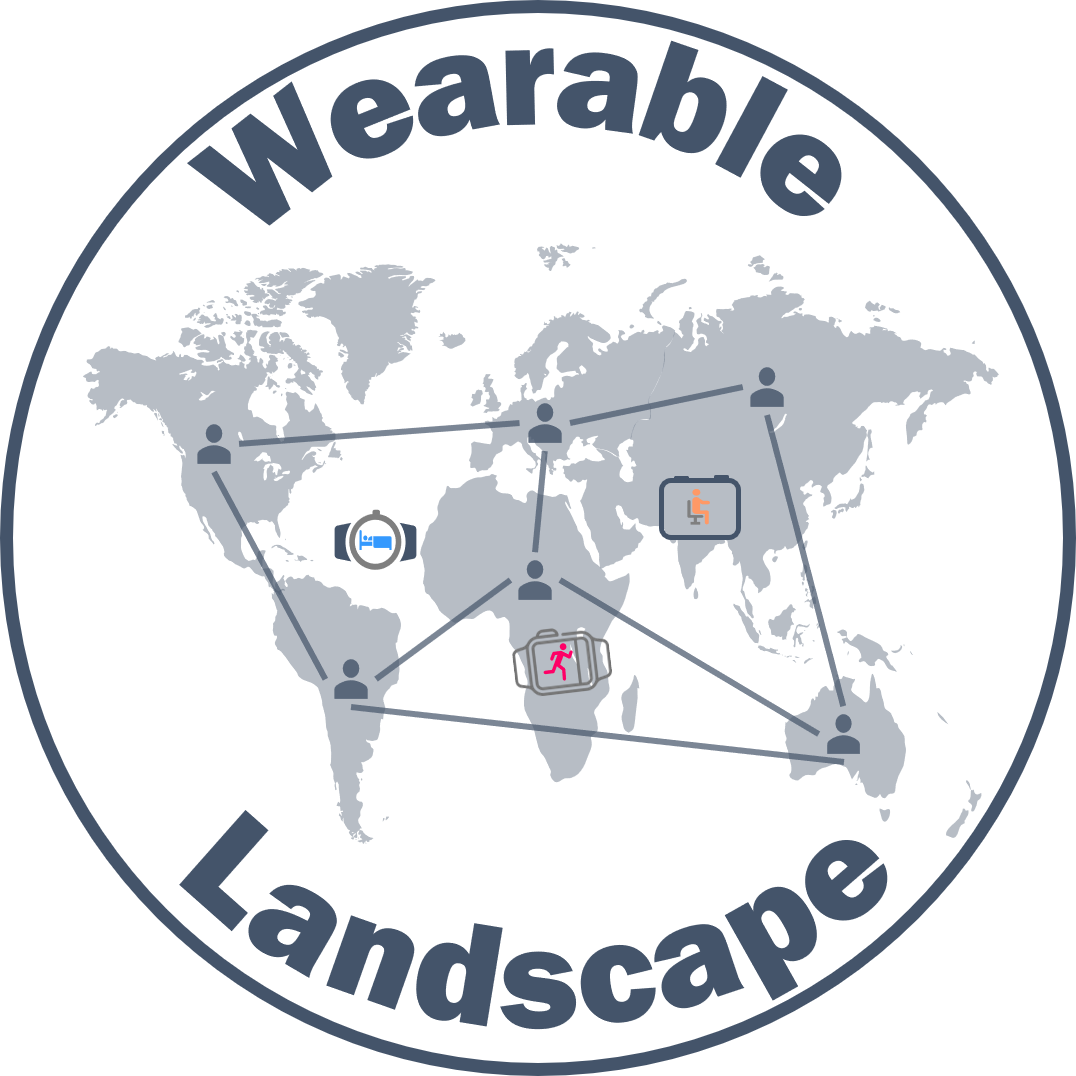Organisations

International Society for the Measurement of Physical Behaviour
The International Society for the Measurement of Physical Behaviour is a non-profit scientific society which focuses on the issues related to ambulatory monitoring, wearable monitors, movement sensors, physical activity, sedentary behaviour, movement behaviour, body postures, sleep and constructs related to physical behaviours.
Mission Statement The Society aims to promote and facilitate the study and applications of objective measurement and quantification of free-living physical behavior(s) and its related constructs (e.g. energy expenditure, context) using wearable devices. The Society is characterised by:
- its multidisciplinary focus; including engineering, signal analysis, physiology, medical sciences, public health, psychology, ergonomics and sports.
- bringing together people from a wide variety of backgrounds and expertise, including researchers, clinicians, therapists, signal analysts, computational scientists and commercial companies

CAPA - Center for the Assessment of Physical Activity
Objective
CAPA is an association of scientists from various disciplines and companies with proven expertise in recording and analysing physical activity. The aim is to pool expertise, draw up joint guidelines, optimise and validate existing methods and establish new procedures based on technical and methodological developments. In addition, the latest findings from research are to be integrated into academic training in an interdisciplinary teaching programme. The centre is the national and international point of contact for anyone seeking training, advice and support in the design, implementation and analysis of studies and programmes to record physical activity.
Projects

BeACTIVE
Objective
BeACTIVE focuses on one of the most serious global health problems: Physical inactivity. Mobile technologies will be used to develop a self-learning system that uses artificial intelligence to support the promotion of physical activity at the right time and in the right environment.
Cooperating partners
- FZI Research Center for Information Technology
Contact
Marco Giurgiu: marco.giurgiu@kit.edu

EMIA - Break up Sedentariness
Objective
The main aim of this project is to investigate the causal effect of sedentary breaks on affective and cognitive parameters in everyday life by using a within-person encouragement design (WPED).
Contact
Marco Giurgiu: marco.giurgiu@kit.edu

MoMo 2.0 Study
Objective
The Motorik-Modul Study (MoMo) originated as a sub-module of the nationwide German health Interview and Exmanination Survey for Children and Adolescents (KiGGS) of the Robert Koch Institut (RKI) and has been conducted since 2003. As a result of a resolution of the German Bundestag, we are therefore now conducting the study under the name MoMo 2.0 in even more locations in Germany since October 2022. Funded by the German Federal Ministry of Health, the aim of MoMo 2.0 is to study the course and development of physical fitness and activity behavior of the population living in Germany over a longer period of time. These results help to improve the health situation in Germany.
Contact

COMO
Objective
COMO is a merger of the COPSY and MoMo studies. It examines the long-term effects of the COVID-19 pandemic on the physical and mental health and health behavior of children and adolescents against the background of socio-ecological contexts in Germany and aims to identify suitable interventions to support their health and development.

Cerberus
Objective
Cerberus is a nationwide initiative leveraging wearable technology to transform public health research. It focuses on three key areas: 1. Synthesis: Compiling and evaluating existing research on wearables to provide a consolidated view of their capabilities in health monitoring and enhancement; 2. Validation: Assessing the accuracy and reliability of data from wearable devices to ensure trustworthy health metrics for individual and public health applications; 3. Data Donation Platform and Databank: Creating a platform for the donation of wearable data, enabling the collection and analysis of large-scale datasets. This initiative addresses data fragmentation across different devices and encourages public engagement in health research, while prioritizing data privacy and ethical practices. By integrating these components, Cerberus aims to provide data-driven insights into sustainable well-being and community health.
Contact
Cailbhe Doherty: cailbhe.doherty@ucd.ie
Comparison of wearable and nearable research-grade and consumer devices that measure daily physical behaviours (sleep, sitting and physical activity)
Objective
Aim: To determine if physical movement and sleep behaviour outcomes differ between brands of activity and sleep monitor (research-grade and commercial), and their location on the body.
Methods: Participants (n=30-50) will be asked to wear a variety of research-grade and commercially-available physical activity and sleep monitors for three days. Devices include GENEActiv, ActGraph, Axivity, activPAL, and fitbit. These devices will be worn on the dominant and non-dominant wrists, upper arm, waist and thigh. There will also be the option of using two at home sleep and time in bed monitors (z-machine and Emfit) for one night.
Contact
Charlotte Edwardson: ce95@leicester.ac.uk

DBDP
Objective
The DBDP is an open source platform for data, code, algorithms, and educational resources to make discovering digital biomarkers more accessible and establish best practices for the field.
Contact
Jessilyn Dunn: jessilyn.dunn@duke.edu
Smart Hospital: Intelligent Framework Tools and Solutions (SHIFT)
Objective
The hospital of the future will be different from the one we know today. Through the consistent use of new forms of organisation, digital technologies and the networking of processes and data, the hospital is continuously being transformed into an intelligent system – the smart and liquid hospital. Here, the focus is even more on people than currently, while the needs and experiences of patients, their relatives, and heath care employees are central.
Within the framework of the Innosuisse-funded flagship, five research partners (ZHAW, USB, UNIBAS, UZH, and FHNW) and 24 practice partners are working together under the leadership of the ZHAW Digital Health Lab. The host institution is the Winterthur Institute of Health Economics. The starting signal for the 5.7 million Swiss franc project was given on 1 January 2022. With a timeframe of three and a half years, it is expected to be completed in the summer of 2025.
Contact
Samuel Wehrli: wehs@zhaw.ch
Focus Watch
Objective
The Focus Watch is a smartwatch that helps children with ADHD to concentrate on schoolwork. Our watch recognises a lack of attention and specifically promotes focus. With ADHD prevalence of 5-7% in children, this is an innovative alternative to medication and therapy.
Contact
Samuel Wehrli: wehs@zhaw.ch
Research tools

Accelerometer metric-converter
Objective
This web app allows users to compare and convert accelerometer data from different sensor positions and different metrics. In addition, averages and standard deviations across 32 different activities can be interactively displayed and compared per metric and sensor location. The web-app covers the metrics MAI, ENMO, MAD, and CPM and the sensor locations hip, thigh, wrist, chest, ankle, and upper arm.
Contact
Robin Olfermann: Robin.Olfermann@ruhr-uni-bochum.de
Companies
Smilamind
Smilamind tackles the mental health crisis with an advanced triage system designed to optimize therapy efficiency. An AI-powered remote monitoring tool supports psychotherapists in prioritizing young patients' needs by providing real-time insights, enabling timely and effective interventions, and streamlining care. The companion app, used by adolescents between therapy sessions, collects and analyzes health assessments, behavioral patterns, and biometric data—such as activity levels, sleep habits, and screen time—sourced from commercially available wearables. This data is then presented to professionals through an intuitive dashboard, empowering them to prioritize care and gain meaningful insights into the patient's condition.
Contact

2M Engineering
2M Engineering specializes in the development of advanced wearable sensor products, offering comprehensive services that encompass the entire product lifecycle—from initial concept to large-scale production. By leveraging their multidisciplinary expertise and comprehensive service offerings, 2M Engineering delivers innovative wearable sensor products that meet the highest standards of performance and compliance, supporting clients in bringing their ideas to market successfully.
Key Services:
- End-to-End Product Development: 2M Engineering manages every stage of wearable sensor product creation, including design, prototyping, industrialization, certification, and production. This integrated approach ensures seamless transitions between phases, maintaining quality and efficiency throughout the process.
- Expertise in Hardware and Software: The company focuses on hardware development, embedded software, and signal processing, incorporating wireless and IoT connectivity to create robust and reliable wearable devices. Additionally, 2M Engineering provides full end-to-end solutions that include product design, web, app, and cloud software applications, ensuring comprehensive support for clients’ needs.
- Regulatory Compliance and Certification: With extensive experience in medical device certification, 2M Engineering guides clients through the complexities of regulatory compliance, ensuring products meet necessary standards and are ready for market entry.
- Tailored Solutions for Various Applications: Specializing in medical wearables, sport wearables, and professional wearables, 2M Engineering develops customized solutions that address specific industry requirements, enhancing performance and user experience.
Examples:
- Activ8: Activ8 offers advanced wearable activity monitors designed for researchers and professionals seeking precise and reliable data on physical activity and sleep patterns. These devices automatically classify various activities—such as sitting, standing, walking, cycling, and running—providing detailed insights into daily behaviors without manual input.
- QSense-Motion: QSense offers advanced wearable motion sensors and comprehensive motion tracking solutions tailored for researchers and professionals across various fields. The technology is designed to deliver precise, real-time data on human movement, facilitating detailed analysis and application in areas such as sports science, virtual reality, and rehabilitation.
- PCARDIO Wearables: PCARDIO Wearables specializes in advanced cardiac & multi-sensor monitoring solutions, offering high-resolution ECG recorders and comprehensive software applications tailored for researchers and professionals in the medical and health sectors. Key offerings are 1, 6 and 12 lead compact ECG recorders that capture high-resolution, raw sensor data across the channels, providing detailed insights into cardiac activity and respiration.
Contact
